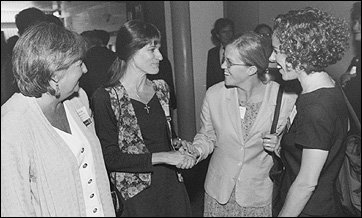![]()
Departments
![]()

|
Week of 18 September 1998 |
Vol. II, No. 6 |
Feature
Article
Westling to new faculty
Not only connect, but be part of students' lives
By J. Nicole Long
To celebrate the new faculty's arrival, Boston University President Jon Westling invited them to become discontented.
He began last Thursday's New Faculty Orientation in Metcalf Hall by praising the progress of the University during the past 30 years, and the new faculty members for their merits and new positions. However, he cited discontent as the central factor in the University's success. "The need for improvement," he said, "catches us at every corner, in every classroom, every laboratory, and every library -- every day. The administration does not conceive its role as distracting people with soothing answers to such discontent."
Westling criticized American higher education for focusing on expertise and specialized knowledge. He observed that specialization undermines the traditional purpose of a university, which was conceived for a broader task. He said that education was not intended to be only the transfer of information from one cerebral cortex to other cerebral cortexes. "By mistaking one part of education for the whole," he asserted, "we focus too much on the tools and too little on their purpose."
|
|
|
University Scholar/Teacher of
the Year Natalie McKnight, CGS associate professor
of humanities and rhetoric, receives
congratulations from colleagues following the New
Faculty Orientation. From left: Linda Wells,
special assistant to the provost for University
accreditation, McKnight, and Jennifer Ivers and
Davida Pines, both new CGS assistant professors of
humanities and rhetoric. Photo by Fred Sway
|
"She sought out student contact," Silber said. "For four years she lived as a faculty-in-residence in three different dorms. She sat on the Faculty Council, edited the College of General Studies literary magazine, and served for four years on the board of directors for BU's Children's Center."
Westling said he is concerned that too many universities have become "late-adolescent ghettos. We've allowed our students to avoid nearly all personal reflection on, for example, Othello's rage, and offered instead little more than dormitory rules as instruction for their souls." But he did not tear down the idea of that ghetto without suggesting meaningful ways to rebuild.
The role of the new faculty, according to Westling, is to reestablish the traditional roots of the university. "Our commitment to educate the whole person," he said, "requires you to live your subject, to live the books that you teach, the ideas that you believe in. But practically, you can accomplish this only by being on campus, available to meet with your students. If students cannot see you, they cannot see you living your intellectual and professional enthusiasms and commitments."
Westling said that lack of contact with adults allows students to rely on popular culture and their own, often solipsistic, wanderings for counsel. He suggested that it is the responsibility of BU faculty to offer them, instead, "the deeper meditations of our best artists, scientists, and philosophers." Good advising isn't a specialization, he said, but an aspect of everything members of the faculty do.
"The student who, after painstakingly working in the laboratory, has just botched an experiment for the third time does not need a mental health expert. She needs you -- not Prozac -- to demonstrate that there is joy as well as despair to be found on such intellectual adventures," Westling said.
Measuring the current attitudes of higher education against the "great tradition," he concluded that education must be placed in a moral context. He said advising is the means for open contact with students, and that "the mundane task of making sure students register for the right classes is a step toward what's necessary to the deeper role: to encourage the fragile first growth of serious intellectual inquiry."
Westling's remarks followed introductions of new faculty members by deans and department chairs. New members said they agree with Westling: mentorship is vital to the task of the University.
"I think some professional boundaries can be extended as President Westling is suggesting," said Roy Grundmann, visiting assistant professor of film and televison. "There can be more concern and outreach -- I think that is right and appropriate. I think it can happen here."
Joyce Wong, Clare Boothe Luce Professor of Biomedical Engineering, said, "Any successful scientist has had a mentor sometime during their career. It is important that students have guidance. I'm involved in an advising program for our freshmen. The students take a class, and there are scheduled events and social activities where the faculty and students are both involved. I think it's important that students have at least one faculty member they can identify with."
